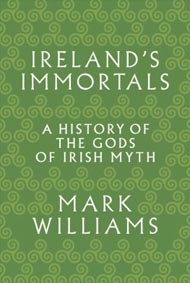Ireland´s Immortals
A History of the Gods of Irish Myth
Mark Williams
Princeton University Press, 2016
Ireland´s Immortals tells the story of one of the world´s great mythologies.
The first account of the gods of Irish myth to take in the whole sweep of Irish literature in both the nation´s languages,
the book describes how Ireland´s pagan divinities were transformed into literary characters in the medieval Christian era -
and how they were recast again during the Celtic Revival of the late nineteenth and early twentieth centuries.
A lively narrative of supernatural beings and their fascinating and sometimes bizarre stories, Mark Williams´s
comprehensive history traces how these gods - known as the Túatha Dé Danann - have shifted shape across the centuries.
We meet the Morrígan, crow goddess of battle; the fire goddess Brigit, who moonlights as a Christian saint; the fairies who inspired
J.R.R. Tolkien´s elves; and many others. Ireland´s Immortals illuminates why these mythical beings have loomed so
large in the world´s imagination for so long.
"Imaginative, well-written, and full of interesting information... Williams´s book is a magnificent and
exciting undertaking."
- Éilís Ní Dhuibhne, Irish Times
"A Fascinating history... Williams... is equally at home in the arcana of Old Irish texts and modern English-language
writing, and it is this range of erudition that has allowed him to write the first full overview of the long twilight of
the Irish gods."
- Fintan O´Toole, New York review of books.
"Williams has a wealth of insight for his readers. No book like this has ever been written before: and all who seek to
gain a better sense of its subjects... will be in its author´s debt."
- John Carey, Studia Celtica
"What is really impressive in this book is Mark Williams´s ability to bring together modern English and
medieval Irish literature... It is a beautifully written analysis, bursting with ideas and new insights."
- Clare Downham, International Yeats Studies
Mark Williams is Fitzjames Fellow in Medieval English at Merton College, University of Oxford,
and Lecturer in Celtic in the Faculty of Medieval and Modern Languages.
(Bovenstaande tekst komt van de achterkant van het boek)


